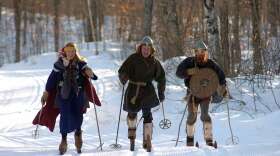President Obama has called climate change a slow-moving catastrophe, yet we’ve heard little about the issue during this campaign season.
That goes for the U.S. Senate race pitting Democrat Russ Feingold and GOP incumbent Ron Johnson. Their campaigns have sizzled around their disparate views on just about everything else - from job creation to immigration.
Yet, they have said little about how they would approach the subject of climate change.

Dairy farmer Lloyd Holterman likes where Johnson stands on issues.
Holterman milks 900 cows on his farm an hour west of Milwaukee. Milking is a 22 ½ hour-a-day process on Holterman’s farm. So one of his top priorities is staffing.
“We employ 18 full time, about 40 to 50 percent of our staff is migrant. Ron Johnson understands labor issues. We need a critical number of workers and he understands that…secure the borders yes, but we still need some kind of a program that allows for people to come here and work,” Holterman says.
And Holterman believes the incumbent Senator understands dairy farmers’ concerns about climate change, “Because if we are really heating up that changes the development of our crops, how well they feed. It can impact everything,” he says.
Holterman believes farmers must meet the challenge with a “step by step” approach.
“We are conquering this one thing at a time. Our water usage on our dairy, for every gallon of milk we’re using about 40 percent of the water we did even 15 years ago, which means we use less electricity, about 30 percent less electricity for every gallon of milk for cooling.” Holterman adds, “So our carbon footprint is dramatically reduced.”
It’s not as easy to confirm the veracity of Holterman’s take on the Johnson. Multiple attempts by WUWM to interview him about this topic failed.
But journalists did quiz Johnson and Democratic opponent Russ Feingold about climate change during a debate in Green Bay.
Here is Johnson’s response to the question - what is the most important energy source of the future and what can be done to get us there?
“I’m for an all of the above energy strategy. I’m not opposed for some government funding for catalysts for wind and solar and those sort of things to fund basic science, but in the end it’s got to be market based, because if it’s not market based because as President Obama says and Senator Feingold would support, electricity rates would necessarily skyrocket and that’s not good for our economy and again, we really need to focus on economic growth,” Johnson said.
Johnson has faced criticism about what seems a shifting stance on climate change; from him questioning whether it is “man-caused” to suggesting humans flourish in warmer weather.
Challenger Russ Feingold seizes any opportunity to contrast his position.

“This is enormously threatening to the future of our country and our planet. Anyone who talks about children, grandchildren, great grandchildren has to take this seriously. The climate is obviously changing dramatically,” Feingold says.
As for strategies, Feingold calls President Obama’s Clean Power Plan a good starting point.
The plan calls for the country to cut back carbon emissions 30 percent by the year 2030. At the moment, the controversial framework is bogged down in a court challenge.
“I think the president has moved us in the right direction and we’re going to have to take serious bipartisan efforts to broaden those efforts,” Feingold says.
The Sierra Club supports Feingold’s position that the U.S. must move toward using diverse energy sources.
“In so doing will create thousands of jobs…as we phase out fossil fuel use and use sun, wind, geothermal sources of energy. That’s going to give us a cleaner environment. It’s also a matter of conscience,” Dianne Dagelen says. She chairs the local Great Waters Group.

Chris Young and his students have been observing the thread of environmental discussion during the campaign cycle.
Young teaches a global citizenship course on climate change at Alverno College.
“They’re wondering what kinds of answers are possible out there and I think it’s difficult to divide climate change in some simple way along a political spectrum from liberal to conservative,” Young says.
Young says discussion of climate change has lost, rather than gained political traction.
"I see my students really struggling to understand, where does this scientific issue become an economic or a political issue. There is a set of possibilities you can have an extreme on one side, or an extreme on the other." - Chris Young
“It’s to a point now where the solution looks so distant and so unreachable that major candidates in most races don’t really want to talk about it. In fact they don’t want to talk much about environmental issues much at all, because this one became the predominant one.” Young adds, “And its solution is so elusive.”
We may gain foreshadowing of the direction the U.S. will head on climate change, following next Tuesday’s election.







